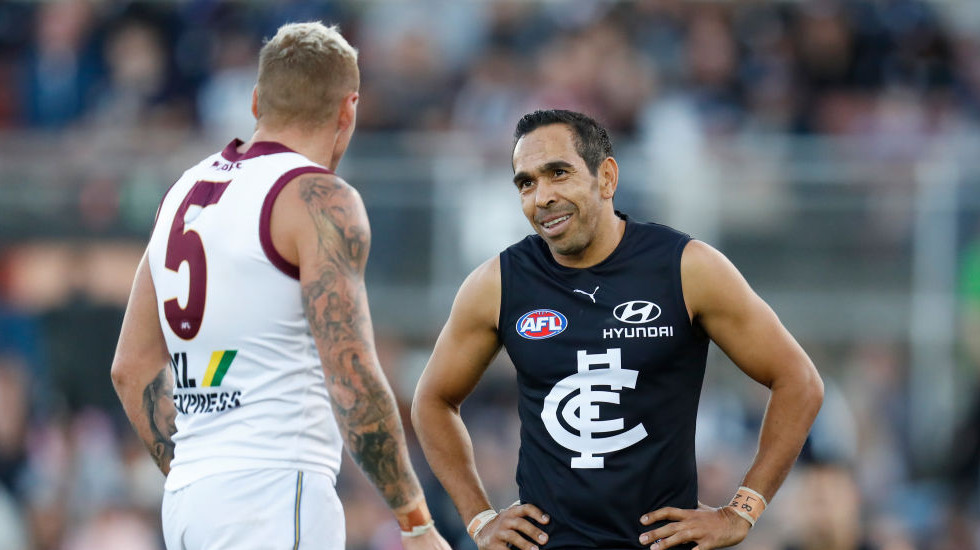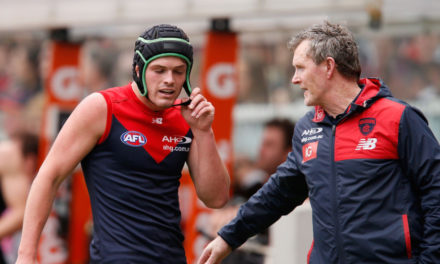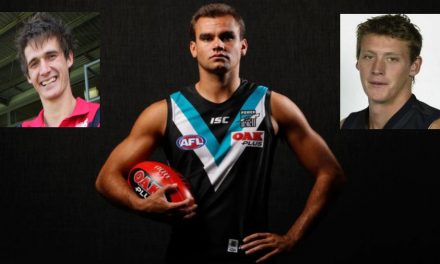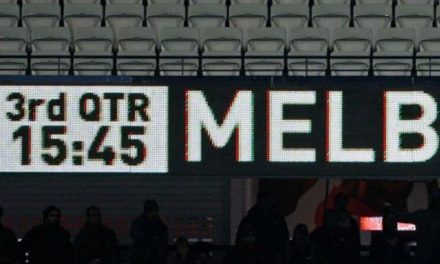Eddie Betts has a laugh with former Carlton teammate Mitch Robinson during the 2020 pre-season. Photo: AFL MEDIA
Let me preface this by stating something quite simple.
I am a white boy, to white parents, who grew up in white neighbourhoods in a predominantly white country.
I can’t begin to fathom the day-to-day venom that indigenous AFL players deal with on social media, so I am not in a position to tell anyone the only way how to handle things when a situation as abhorrent as the latest trolling racism saga rears its head.
The extent to which I get trolled on social media isn’t comparable.
I might get the occasional “fat c—“ or “cut your hair, you girl” (jokes on them, it’s an old profile pic and I cut it three years ago), but I’ll never receive the vitriol someone like Eddie Betts gets, which is additionally disappointing because despite my best efforts I know I will never provide the joy to the general public like the Adelaide and Carlton legend has for the past 15 years.
When someone the calibre of Eddie can get so consistently abused online and yet nothing is done, that’s a problem.
The entirely scenario has become tragically routine.
Random dickhead with a randomly generated profile (likely from his 12th account following 11 previous bans) posts a racial slur directed at a player.
This slur is often in the comments section of an official club post or the players personal page because, let’s face it, the scope of the audience is larger than the seven Russian sex bot followers this pathetic individual has amassed on their own account.
From there, faith in humanity is somewhat restored as the post is widely panned and lambasted as many members of the public report the account.
But within that vigilante justice – the post grows legs.
It catches the ire of media outlets, the player may comment on it, if the player comments on it then the club often follows suit, as do other clubs, as does the AFL Players Association and often the league itself.
Now the poisonous quote that was initially posted to garner a small amount of passing attention has a nation talking. This person and their dumpster fire of an opinion is now larger than they ever dreamed.
You may have an idea of where this point is taking us, but I assure you, we’re taking a different route. This isn’t a “social media isn’t real, just ignore it” article.
To quote Carlton captain Sam Docherty in the aftermath of the saga: “To ignore it is to be part of the problem, to call it out is to be part of the solution.”
Public and vocal slap downs of incidents like these are necessary.
Players, clubs and the league itself possess a very strong platform to help establish a standard and set an example for younger generations that this behaviour is unacceptable and unjustifiable in every possible way.
But unfortunately, no amount of statements, solidarity or hashtags can alter the very simple fact that social media is a toilet. It’s a toilet overflowing with the remnants of the worst characteristics of the worst characters to inhabit the earth.
Apologies for the imagery, but I’m making a point here.
As mentioned, the AFL has an outstanding platform to influence change, and while the efforts of altering generations of systemic racism may be out of their grasp in the short term, there is something more they can do than just condemning and cancelling a membership.
For too long, social media platforms like Twitter have been a haven for spineless, cowardly individuals to spew bile without the fear of repercussions, and we are seeing this regularly take a toll on AFL players, not to mention everyday citizens.
All clubs, players and the league itself should use their societal standing to put pressure on the Australian government to explore ways to enforce greater regulation on social media services, most notably, the removal of the safety blanket of anonymity.
What this protest looks like, I don’t know.
Do clubs go social media silent for a week? Probably not, as they have analytics to reach and sponsors to redirect clicks toward.
Do they switch to a private account so as to only allow who they want? Probably not, as it removes any chance of content going viral, the holy grail of any communications department.
Admittedly, the answers are more difficult than the question, but as long as people are able to act with impunity from being identified on social media, these attacks will continue to occur, regardless of how many well-meaning campaigns are designed to stamp them out.
This isn’t a one or the other discussion, this is about taking a stand and then taking further action. And it is bigger than football.
This about making people accountable for their actions and doing so by pushing for mandatory identification requirements for social media.
Much like a shopping centre wouldn’t allow someone to speak in a public square without acquiring permission, so should we demand of our lawmakers that large, influential platforms like Twitter and Facebook, at least in Australia, adhere to similar rules.
Yes, we would likely receive the predictable backlash from the “I don’t want social media to have my private information!” crowd.
But if you are part of that collective – let me take this time to remind you these companies already have everything they want on you from the countless “What type of warrior was I in a previous life” quizzes you’ve taken, and the fact that the advertising seems to directly bombard you with things you’ve recently Googled should be a tell-tale sign.
Of course, the AFL does not have the power to change this overnight – after all, the mechanical, Doctor Octopus-like tentacles of the robotic Mark Zuckerberg and company are as far reaching as they are influential – but if there’s one thing the past month has taught us, it’s that you’re doing society a disservice if you have a platform and don’t use it to progress the world we live in.
Statements serve a purpose – but if we really want to deprive these racially-charged oxygen thieves of the clean air we try to bestow to the world, the directive needs to come from higher, the face needs to be revealed and the safety blanket removed.
We need compulsory identification for social media accounts. And if you don’t want to demand it for yourself, demand it for Eddie. It’s the least we could do.












What an amazingly logical thing to propose. If you won’t put your name to a comment then it shouldn’t be published. Have the courage to put your name to your opinion, or keep your opinion to yourself.